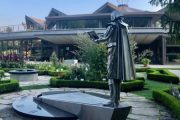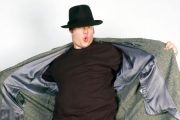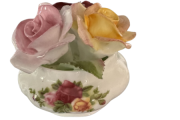My teenage years were dark years. Tiptoeing around my father’s simmering anger; standing helpless to staunch my mum’s tears. I felt fear and I felt rage and shameful relief when I wasn’t the victim. I hid behind excelling at school, prowess in sports and hours at the family diner. Anything that met with his approval. I escaped inside with books and music and, yes, alcohol.
It was my age of science fiction and fantasy: Isaac Asimov’s robots, Arthur C Clarke’s Childhood’s end, Frank Herbert’s Dune, Ray Bradbury’s Fahrenheit 451, Harry Harrison’s Stainless-Steel Rat and the dystopian futures of The Time Machine, 1984, and Brave New World. So, so many. Each one taken to the bay window, curling into its space, the curtains comfortably closed, and reading until daylight faded or homework called.
All these imagined worlds were book-ended by the Hobbit and the Heart of Darkness by Joseph Conrad. One a serendipitous selection from the library filled with eminently believable oddball and fantastical creatures and personalities, weaving through oddball adventures and conversations and coming to an end with more questions than seeming answers, leaving me aching for more. So, what if the thread was greed for gold? What if dwarves and elves couldn’t be trusted, hobbits and wizards were true. I imagined a writer, quill pen in hand, dipping into black ink and somehow, by the time pen touched paper, banishing its darkness to the corners and setting the tale run innocent and free. The other was a text in English Literature. My body aches – my mind shrinks – whenever I think of the other book. The Heart of Darkness. It held me in thrall. Its darkness reflecting the darkness in my life. Both darknesses as addictive as they were painful. Conrad’s words suck you along the great Congo river, placid scene by placid scene morphing stealthily from the mundane to the horrific. The river seducing ‘as a snake does a sparrow’. It isn’t until the end that you realise what you’ve seen and how inured you’ve become. Only in Kurtz’s last words ‘the horror, the horror’ and the heads on the stakes do your eyes open to the insidious barbarity. Ordinary men become bureaucratic purveyors of greed. Closing the covers, you breathe ‘wow’.
Somewhere, inside and around all this, lived music. On its own, it took the place of poetry. Taken with a book, it wove a mood between the words and set their rhythm. The book-ending stories were laced with the music of the Moody Blues, Santana, Black Sabbath, Beethoven’s Ode to Joy, Smetana’s Moldau and Sibelius’ Finlandia. I played them on my briefcase sized Dansette record player. It was monaural only and the sound was crap really but it played both albums and 45s. In automatic mode, you could stack four albums. Barbaric, true, but I wanted to read and listen; not to be fussing with record changes every 20 minutes
In my passion for science fiction and fantasy I found friendship – Alan Murray, the finder of everything science fiction. A loner too, dealing with his family life through bravado and dreams of future status and future deeds. A Walter Mitty of sorts. He never reached even the first rung of anything other than his passion for science fiction. Yet, he was a wonderful pal. Jovial and adventurous. Full of mischief. Always on the edge. Mirth was his stock in trade.
The books we shared, the music that I loved, our friendship and Alan’s mirth – these were the gifts that were the darkness busters of my teens.






Peter Scotchmer2 years ago
Why, I wonder, did it take me so long to find this gem by David Morris? The testimony of a young life transformed by good books and eclectic music choices is wonderfully convincing. I also read as David did, and still do.As CS Lewis said, “We read to know that we are not alone.” I do hope other readers of SQ can appreciate and even share such transformative influences, here so eloquently conveyed. Excellent work, David!